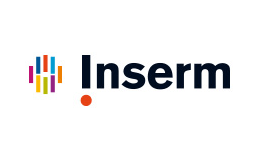Group 2- Helicobacter pylori infection and gastric carcinoma (PI: Christine Varon and Emilie Bessède)

The activities of the group are divided into two main axes:
Study of the signaling pathways induced by H. pylori and leading to gastric carcinogenesis
We have previously shown that H. pylori infection induces the emergence of CD44+ cells with CSC properties via an epithelial to mesenchymal transition (EMT) (Bessède et al, Oncogene 2014). In this context, using a transgenic mouse model in which the integrity of epithelial cell-cell junctions is weakened and the mice are predisposed to EMT (IQGAP1 deficient mice), we have confirmed that induction of EMT favours and accelerates H. pylori induced gastric carcinogenesis (Bessède et al, Oncotarget 2016). We then performed a comparative transcriptomic study of gastric epithelial cells infected or not with carcinogenic strains of H. pylori; this study revealed several differentially regulated pathways. Among them, we showed that the Hippo pathway kinase LATS2 is activated and restrains the trans-differentiation into intestinal metaplasia induced in response to H. pylori (Molina-Castro et al., CMGH 2020), and that the autophagy induced by H. pylori is necessary for gastric CSC emergence (Courtois et al, Gastric Cancer 2020, in press).
Characterisation and targeting of gastric CSC biomarkers and signaling pathways
Using patient derived gastric carcinoma samples collected in collaboration with the Departments of Digestive Surgery and Pathology at the CHU Bordeaux and Bergonié Institute, we have developed original models of patient derived gastric carcinoma xenografts in immunodeficient mice (PDX). Using these models, we characterized CD44 and ALDH activity as the main markers allowing the identification and study of gastric CSC (Nguyen et al, Clinical Cancer Research 2017). We showed using different strategies that targeting gastric CSC is possible to inhibit tumour growth in vitro and in PDX mouse models. We showed that All-Trans-Retinoic-Acid (ATRA) induces the differentiation of CSC and inhibits their tumourigenic properties (Nguyen et al, Oncogene 2016). Targeting the Hippo/YAP pathway with Verteporfin was also an efficient strategy to inhibit CSC properties (Giraud et al, Int. J. Cancer 2019). Metformin, an anti-diabetic agent also described as an EMT inhibitor in other cancers, was also shown to inhibit CSC phenotype and tumourigenic properties (Courtois et al, Eur. J. Cancer 2017). Interestingly, we showed that metformin also inhibits H. pylori growth in vitro and in vivo (Courtois et al, Future Microbiology 2018). Stools have been collected from these mice and metformin's effects on gastric and gut microbiota will be studied. With C. Gronnier (digestive surgeon), we developed new models of orthotopic xenograft of patients’ derived GC (PDOX) developing metastases, allowing the study of CSC dissemination and metastatic properties (Giraud et al, Cancers 2019). With the expertise of F. Couillaud in live molecular imaging and vectorization strategies with whom we previously developed CSC-based targeted strategies (Staedel et al, MTNA 2015), we plan to test these drugs in these pre-clinical models to evaluate their putative anti-tumourigenic and/or anti-metastatic properties.
5 main publications
1 - Nguyen PH, Giraud J, Staedel C, Chambonnier L, Dubus P, Chevret E, Gauthereau X, Bœuf H, Rousseau B, Fevre M, Soubeyran I, Belleannée G, Evrard S, Collet D, Mégraud F, Varon C. All-trans retinoic acid targets cancer stem cells in patient’s derived primary gastric carcinoma and inhibits tumor growth. Oncogene. 2016 Oct 27;35(43):5619-5628. (IF 7.871)
2 - Nguyen PH, Giraud J, Chambonnier L, Dubus P, Wittkop L, Belleannée G, Collet D, Soubeyran I, Evrard S, Rousseau B, Senant-Dugot N, Mégraud F, Mazurier F and Varon C. Characterisation of biomarkers of tumorigenic and chemoresistant cancer stem cells in human gastric carcinoma. Clinical Cancer Research. 2017 Mar 15;23(6):1586-1597. (IF 10.107)
3 - Courtois S, Durán RV, Giraud J, Sifré E, Izotte J, Mégraud F, Lehours P, Varon C, Bessède E. Metformin targets gastric cancer stem cells. European Journal of Cancer. 2017 Oct;84:193-201. (IF 7.275)
4 - Giraud J, Bouriez D, Seeneevassen L, Sifré E, Rousseau B, Mégraud F, Lehours P, Dubus P, Gronnier C, Varon C. Orthotopic Patient-Derived Xenografts of Gastric Cancer to Decipher Drugs Effects on Cancer Stem Cells and Metastatic Dissemination. Cancers (Basel). 2019 Apr 19;11(4). (IF 6.102)
5 - Giraud J, Molina-Castro S, Seeneevassen L, Sifré E, Izotte J, Tiffon C, Staedel C, Boeuf H, Fernandez S, Barthelemy P, Mégraud F, Lehours P, Dubus P, Varon C. Verteporfin targeting YAP1/TAZ-TEAD transcriptional activity inhibits the tumorigenic properties of gastric cancer stem cells. International Journal of Cancer. 2020 Apr 15;146(8):2255-2267. (IF 5.145)




